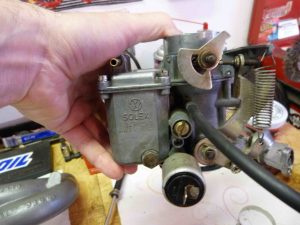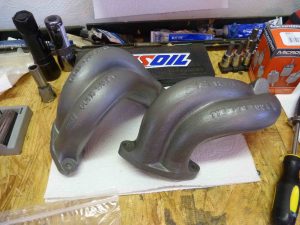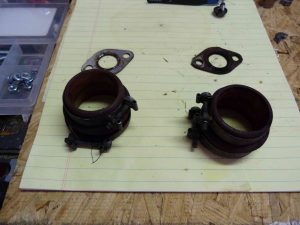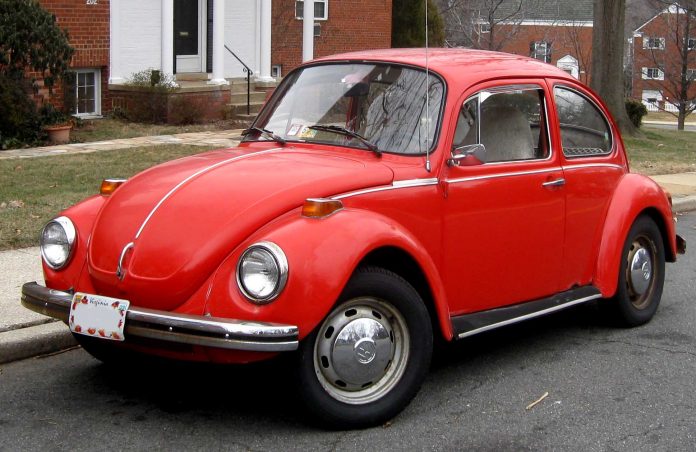Old cars are full of surprises.
When I pulled out the rear seat of the ’64 Chevy Corvair project car I bought in the mid ’90s, I found a mini-bar from the ’70s – complete with cheesy disco-era decanters and shot glasses. The bar was made of wood – which had been cut to fit the metal that had been hacksawed out of the Corvair to make room for it. The car felt a lot tighter when the structure that was supposed to have been there was welded back in place.
Flash-forward to the ’72 Beetle I am helping my teenage protege fix up.
It was running decently as purchased but a closer look at the engine revealed a few obvious little things that needed attention, including usual suspects such as extremely AARP fuel lines in need of immediate replacement and a very low-rent and poorly fitting aftermarket “chrome” air cleaner – the “chrome” apparently applied with a paintbrush.
Such things are par for the course when dealing with a car pushing 50 that has probably had at least five and possibly a dozen different owners over its lifetime, many of those not shall we say mechanically gifted.
One such may have been the owner before the last one – who was a teenaged girl; my protege bought the car from her father and we are pretty sure neither she nor he are responsible for what we found. The thing we found had to have been caused by a Yeti angered by the sound of an air-cooled VW engine.
But it was not found right away. The Yeti was clever; he covered his tracks . . . with RTV. (See here for gory video exposition.)
The first clue was the Solex 28 carburetor – which isn’t the right Solex carburetor for a ’72 Beetle. Which is supposed to have a Solex 34 carburetor. A friend had the correct Solex 34 (Pict 3) and, after a cleaning and rebuilding, my protege and I affixed it to the Beetle’s engine.

Whereupon the engine would not idle.
Rev yes. As long you held it about about 1,500 RPM all was well. But if you let off the throttle, the engine would die. Weird. After all, the engine idled with the Solex 28. I figured – reasonably I thought – it had to be the Solex 34. I rechecked all the obvious things – even to the extent of tearing the carb down again to make absolutely sure the pilot and main jets were not in any way occluded, that all passages were clear – and all screws (idle and air bleed) adjusted within specs.

They were.
Then I checked the idle solenoid switch. But it clicked when current was applied and the internal plunger operated as it was supposed to. Running out of ideas, I grabbed a can of Gumout carb cleaner to check for vacuum leaks.
And found one.
A big one.
To find a vacuum leak, spray the carb cleaner around the suspected area of the leak, such as the base of the carburetor, where it sits on the intake manifold. Sometimes a bad gasket or loose bolts will cause a leak. But the gasket was new and the bolts were correctly torqued down.

Still, the engine reacted immediately when that Gumout spritz contacted the area around the base of the carburetor. And so I began to wipe away what I thought was just grime around the base of the intake manifold . . . .
And discovered something loose. On the side of what was supposed to be a solid casting, a single piece of cast iron/steel. The grime wasn’t. It was black RTV – Room Temperature Vulcanizing silcone – basically, form-a-gasket in a toothpaste tube, a product used to seal things. Normally, a thin bead of RTV would be spread around the perimeter of a thermostat housing or similar prior to re-installation, to assure a leak-free mating of the parts.
It was used for a different purpose here.

Yeti – or whoever he was – had smashed off a chunk of the poor Beetle’s intake manifold; about an eighth of the flange – the flat surface the carburetor sits on – was gone and there was a gaping hole on the side of the flange – one upon a time, the EGR port – which had been artfully plugged with an old bolt smeared generously with RTV. To which more was added once the bolt was “installed,” the Yeti then carefully shaping the still pliable RTV, like cake frosting, into the former shape of the intake manifold.
The horrendous vacuum leak was further “fixed” by using the smaller Solex 28 carb, which – now I noticed it – had an offset adapter plate bolted to its bottom. In order establish a seal, sort of, with the damaged intake manifold.
And by the ghost of Ferdinand Porsche, it worked.

Sort of.
The Beetle ran, but was down on power – for obvious reasons. It ran much better with the Solex 34 mounted – except for the problem of not idling, on account of that horrendous vacuum leak due to the Yeti-mauled intake. So we pulled the intake – which on the Bug requires pulling pretty much everything else (alternator/fan, fuel pump and of course, the carburetor) first to get at the thing and then get it off.
The manifold has a main center section (the Yeti-smashed one) and two cast aluminum intake sections (which, luckily, his paws were too big to get at and so weren’t damaged).
As it turned out, the Yeti did my protege a favor by mauling the center section, necessitating its removal in order to weld it back into serviceable condition. One everything was on the floor of the garage, it became quite clear that the rubber boots which connect and seal the intake end sections to the main section were in bad shape; they probably had leaks, too – or soon would.
New ones were ordered.

More seriously, the heat risers were as clogged as Dan Blocker’s arteries. These are the tubes which carry exhaust gas to warm the intake plenum – so that the gasoline doesn’t freeze on cold days. This is helpful in terms of getting the Beetle to run on cold days. Fixing this problem involved some home engineering; my buddy Tim chocked some flexible wire into a drill and used that to Roto-Rooter the built up rust. That plus a torch and some pressure washing – followed by the welding, sandblasting and coating – and the intake was functionally good as new and looking good, too.
Meanwhile, everything else got the once-over. Just in case – and just because. When you have an old car that was once in the hands of a Yeti, this is prudent – and also part of the fun.
There is discovery – it never ceases to amaze what people (er, Yetis) are capable of doing; of marveling at their home-engineering prowess.
And there is the fun of fixing all that – hopefully the right way, this time!
. . .
Got a question about cars – or anything else? Click on the “ask Eric” link and send ’em in!
If you like what you’ve found here, please consider supporting EPautos.
We depend on you to keep the wheels turning!
Our donate button is here.
If you prefer not to use PayPal, our mailing address is:
EPautos
721 Hummingbird Lane SE
Copper Hill, VA 24079
PS: EPautos stickers are free to those who send in $20 or more to support the site. Also, the eBook – free! – is available. Click here. Just enter you email in the box on the top of the main page and we’ll email you a copy instantly!












Tay Zonday
Chocolate Rain (remix)
https://www.youtube.com/watch?v=PMbz5qy38AU
Chocolate Rain
Some stay dry and others feel the pain
Chocolate Rain
A baby born will die before the sin
Chocolate Rain
The school books say it can’t be here again
Chocolate Rain
The prisons make you wonder where it went
Chocolate Rain
Build a tent and say the world is dry
Chocolate Rain
Zoom the camera out and see the lie
Chocolate Rain
Forecast to be falling yesterday
Chocolate Rain
Only in the past is what they say
Chocolate Rain
Raised your neighborhood insurance rates
Chocolate Rain
Makes us happy ‘livin in a gate
Chocolate Rain
Made me cross the street the other day
Chocolate Rain
Made you turn your head the other way
[Hook]
Chocolate Rain
History quickly crashing through your veins
Chocolate Rain
Using you to fall back down again
Chocolate Rain
History quickly crashing through your veins
Chocolate Rain
Using you to fall back down again
[Verse 2]
Chocolate Rain
Seldom mentioned on the radio
Chocolate Rain
Its the fear your leaders call control
Chocolate Rain
Worse than swearing worse than calling names
Chocolate Rain
Say it publicly and you’re insane
Chocolate Rain
No one wants to hear about it now
Chocolate Rain
Wish real hard it goes away somehow
Chocolate Rain
Makes the best of friends begin to fight
Chocolate Rain
But did they know each other in the light?
Chocolate Rain
Every February washed away
Chocolate Rain
Stays behind as colors celebrate
Chocolate Rain
The same crime has a higher price to pay
Chocolate Rain
The judge and jury swear it’s not the face
[Hook]
Chocolate Rain
History quickly crashing through your veins
Chocolate Rain
Using you to fall back down again
Chocolate Rain
History quickly crashing through your veins
Chocolate Rain
Using you to fall back down again
Chocolate Rain
Dirty secrets of economy
Chocolate Rain
Turns that body into GDP
Chocolate Rain
The bell curve blames the baby’s DNA
Chocolate Rain
But test scores are how much the parents make
Chocolate Rain
‘Flippin cars in France the other night
Chocolate Rain
Cleans the sewers out beneath Mumbai
Chocolate Rain
‘Cross the world and back its all the same
Chocolate Rain
Angels cry and shake their heads in shame
Chocolate Rain
Lifts the ark of paradise in sin
Chocolate Rain
Which part do you think you’re ‘livin in?
Chocolate Rain
More than ‘marchin more than passing law
Chocolate Rain
Remake how we got to where we are
Some worm screw designs have nothing but slick metal around the part while others don’t.
Could you imagine if this had been a modern Rube Goldberg-mobile, instead of one of the simplest cars ever made?!
Imagine the hours and hours it would have taken to find the problem; the disassembly that would have been necessary for access….and then repeated again…..
This simplicity is why this car is still viable and practical 50 years after it was built….while the modern monstrosities are finding their ways to junkyards before they’re 10.
Eric, you commented about this VW having “extremely AARP fuel lines in need of immediate replacement”.
Good move mentioning this. When it’s old enough, the fuel line in Beetles likes to break or come loose from the carburetor when running. Then it will start a fire because of gasoline spraying all over the hot engine.
Years ago I knew a man with a pristine early–1970s Beetle who lost it to fire because of the fuel line in the 1980s. He said that at the yard where it was towed, he saw another Beetle that had caught on fire the same way for the same reason.
Anyone doing EV conversions?
Wouldn’t need much of a motor given its svelte curb weight (~1,850 lb)
Dealing with a previous owner’s ghetto engineering job is an occupational hazard of working on old cars!
Sounds like matters are well in hand though. I have not dealt with one of der Fuhrer’s KDF-wagens in quite a while. You should get a copy of the book “How To Keep Your Volkswagen Alive: A Manual of Step-by-Step Procedures for the Compleat Idiot” by John Muir. First published in the VW Bug’s heydey of the late 1960s, it is still readily available for not too much bread.
Hi Jason,
it is fun – for me and the kid! I gave him my copy of Compleat Idiot, too.
Though very much a product of its times that’s a great book! Should have figured you’d already have a copy. I still have mine around even though I have not wrenched on a bug in many years. (I remember when the streets were full of those cars.)
It’s really a shame that Uncle Scumbag will not permit new vehicles of this type to be sold here any more. I think they were built and sold in Mexico into the early 2000s. You can’t bring a newer one into the US quite yet though due to the 25-year fatwa against private importation of “non-compliant” foreign cars into the U.S.
Hi Jason,
Working on the kid’s Bug has instilled in me a strong desire to have one of my own again. They are such simple fun to piddle with!I never hopped any of the ones I owned up but that idea really interests me. Nothing crazy, just a bit more power.
eric, I think you’ll like a bug featured in the new issue of Hot Rod. It’s a custom job with a 215 Buick aluminum V8. You really should look at it, a beautiful job and a beautiful bill I’m sure.
In the 60’s a guy known for his entrepreneurship started building copies of Meyer Manx dune buggies in Roby, Tx. For many years there were Meyer Manx’s all over this country. So a friend bought one and not being constrained by convention, installed one of the aluminum Buick V8 in it. That was a honkin dune buggy. To this day it’s hard to find a Beetle in this area due to so many being transformed into dune buggies.
Some of the modern hop ups make a vastly improved bug. One of the weaknesses of the air cooled type 1 (at least in the later 15/1600) is that the fuel economy is not really all that great by modern standards. The 1700 strokes I have on good authority make more torque and power than stock while getting closer to 40mpg
Great project, got 3 in the big shop now. And some parts, grab those every time they pop up cheap on CL.
I could never be interested in something that used to be advertised as “fast enough” for freeway driving. The car is too slow for my tastes. Even with more power, its a rolling death trap. I am not against people owning them. Just not for me.
My thoughts exactly, Swamp!
While I love the simplicity of the Hitlermobiles, I sure wouldn’t want to be in such a position of weakness on the road- being the slowest thing on the road….and flimsiest.
Not only does the ug crumple like a wet paper bag, but due to the tight interior quarters, even in a low-speed minor crash, you’re banging your head on something hard! And no one goes through the windshield of a bug- they’re not big enough. You just impaled, as your body hits the dash/pillars/roof at the speed you had been going.
https://www.youtube.com/watch?v=SeMrOQfliCs
Hi Eric,
Sounds like fun. Are the parts starting to become hard to come by? I realize they made more beetles than Mother Nature produced them- but I honestly don’t see them on the road as much.
Hi CP,
Beetle parts are still easy to find and inexpensive. Example: The set of intake manifold boots and gaskets I needed to put the fixed intake back on cost . . . $10. That’s for two boots with clamps and a pair of gaskets for the side sections. If you need one, you can replacement Solex carbs – these are brand new – for about $130. They install in 5 minutes. Two bolts hold them on.
Body/trim parts are no worries, either.
The chief drawback with these cars is that they’re prone to rust and every so often you’ll need to weld in new floorpans!
Are floor pans readily available. Are the newer ones more rigid? If I ever did get a bug, I would dynomat the whole damned thing. I can’t stand the sound. lol. But I suppose that’s the appeal. The only thing that appeals to me is the cheap cost of parts.
I hope the new clamps are not of the worm screw type clamp, those will tear the boots. There is nothing better than original clamps, and looking at the pic of the old ones, that’s what you have. If those originals are still functional, I would use them.